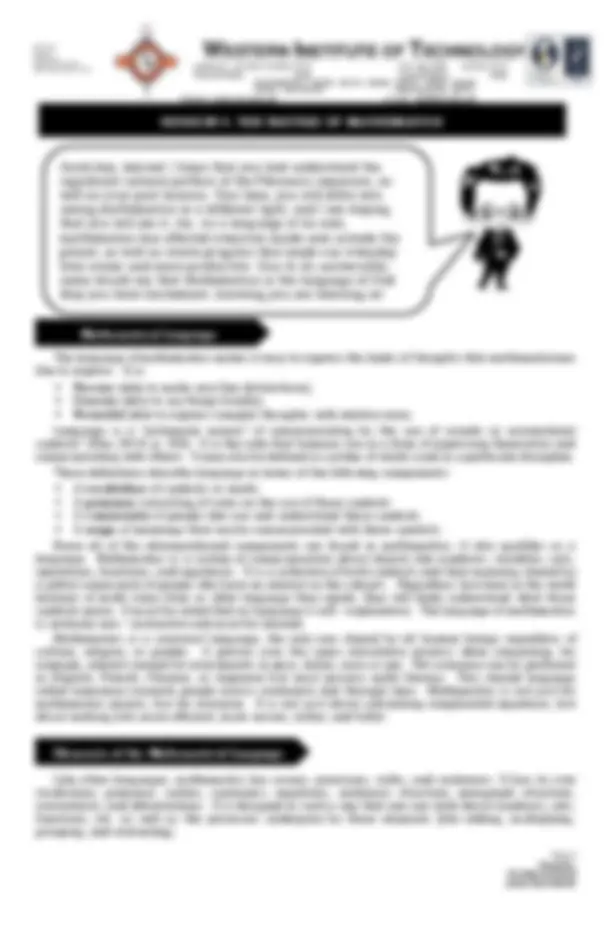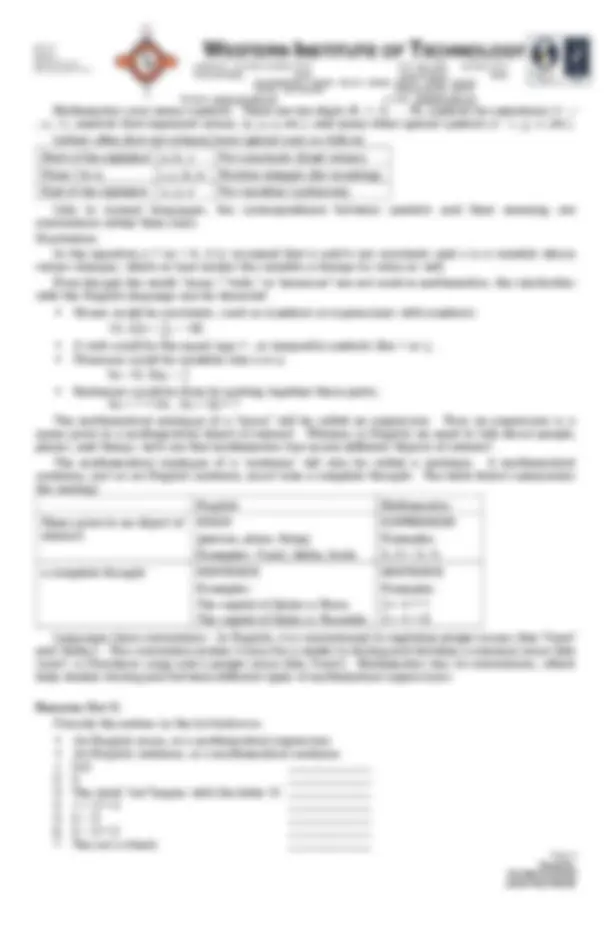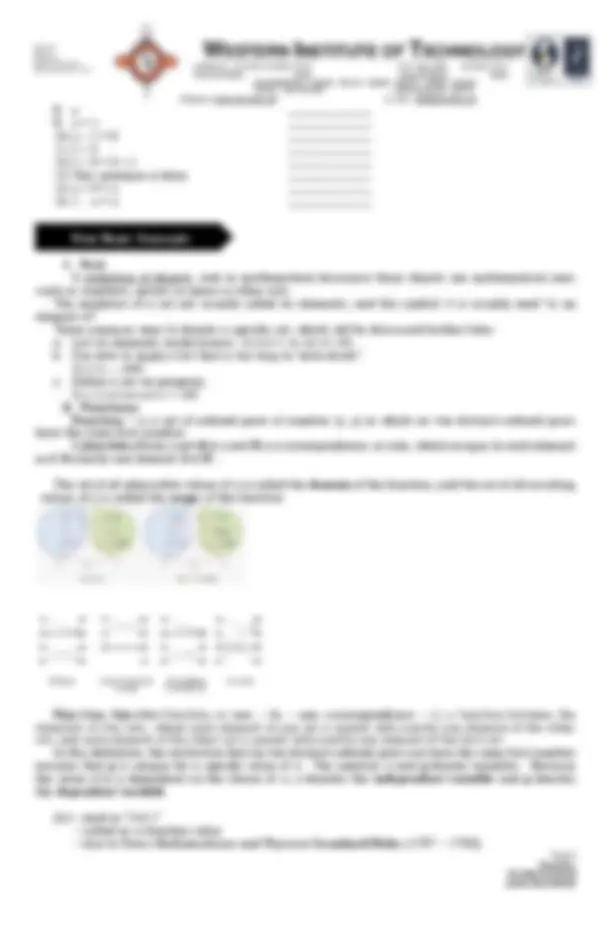





Study with the several resources on Docsity

Earn points by helping other students or get them with a premium plan


Prepare for your exams
Study with the several resources on Docsity

Earn points to download
Earn points by helping other students or get them with a premium plan
Community
Ask the community for help and clear up your study doubts
Discover the best universities in your country according to Docsity users
Free resources
Download our free guides on studying techniques, anxiety management strategies, and thesis advice from Docsity tutors
athematics, the science of structure, order, and relation that has evolved from elemental practices of counting, measuring, and describing the shapes of objects.
Typology: Lecture notes
1 / 6

This page cannot be seen from the preview
Don't miss anything!




LUNA ST., LA PAZ, ILOILO CITY P.O. Box 258 ILOILO CITY
PHILIPPINES 5000 PHILIPPINES 5000
TELEPHONE Nos.: 3200259 3201475 3200902 3209767 3209853 3209456
FAX No. +6333 3201484 Globe-Islacom No. 5087151
Website: www.wit.edu.ph E-mail: wit@wit.edu.ph
Page 1
Prepared by:
Prof. Ninfa Sua-Sotomil
Issue: 2
Revision: 0
Approved: President
Date: November 24, 2014
WESTERN INSTITUTE OF TECHNOLOGY
LUNA ST., LA PAZ, ILOILO CITY P.O. Box 258 ILOILO CITY
PHILIPPINES 5000 PHILIPPINES 5000
TELEPHONE Nos.: 3200259 3201475 3200902 3209767 3209853 3209456
FAX No. +6333 3201484 Globe-Islacom No. 5087151
Website: www.wit.edu.ph E-mail: wit@wit.edu.ph
Page 2
Prepared by:
Prof. Ninfa Sua-Sotomil
Issue: 2
Revision: 0
Approved: President
Date: November 24, 2014
Course Number : Math 1
Course Title : Mathematics in the Modern World
Course Description : This course deals with the nature of mathematics, appreciation of its practical
and intellectual and aesthetic dimensions, and application of mathematical tools in
daily life.
The course begins with an introduction to the nature of mathematics as an
exploration of pattern (in nature and the environment) and as an application of
inductive and deductive reasoning. By exploring these topics, students are
encouraged to go beyond the typical understanding of mathematics as merely a set
of formulas but as a source of aesthetics in patterns of nature, for example, and a
rich language in itself (and of science) governed by logic and reasoning.
The course then proceeds to survey ways in which mathematics provide a tool for
understanding and dealing with various aspects of present – day living, such as
managing personal finances, making social choices, appreciating geometric designs,
understanding codes used in data transmission and security, and dividing limited
resources fairly. These aspects will provide opportunities for actually doing
mathematics in a broad range of exercses
Pre-requisite: None
Credit Units: 3 Units
Course Outline
Section I. The Nature of Mathematics
References:
CHED Memorandum Order No. 20, series of 2013. (4 July 2013). General Education Curriculum:
Holistic understandings, intellectual and civic competencies
Nocon R. et al. (2018). Essential Mathematics for the Modern World. Quezon City: C & E Publishing,
Inc.
WESTERN INSTITUTE OF TECHNOLOGY
LUNA ST., LA PAZ, ILOILO CITY P.O. Box 258 ILOILO CITY
PHILIPPINES 5000 PHILIPPINES 5000
TELEPHONE Nos.: 3200259 3201475 3200902 3209767 3209853 3209456
FAX No. +6333 3201484 Globe-Islacom No. 5087151
Website: www.wit.edu.ph E-mail: wit@wit.edu.ph
Page 4
Prepared by:
Prof. Ninfa Sua-Sotomil
Issue: 2
Revision: 0
Approved: President
Date: November 24, 2014
Mathematics uses many symbols. There are ten digits (0, 1, 2, …, 9), symbols for operations (+ ,–
, x, ÷), symbols that represent values, (x, y, z, etc.), and many other special symbols (+. <, ≤, 𝜋, etc.).
Letters often (but not always) have special uses as follows:
Start of the alphabet a, b, c For constants (fixed values)
From I to n i, j, k, n Positive integers (for counting)
End of the alphabet x, y, z For variables (unknown)
Like in normal languages, the correspondence between symbols and their meaning are
conventions rather than rules.
Illustration:
In the equation y = ax + b, it is assumed that a and b are constants and x is a variable whose
values changes, which in turn makes the variable y change its value as well.
Even though the words “noun,” “verb,” or “pronoun” are not used in mathematics, the similarities
with the English language can be observed:
1
3
5x – 8, 2xy, −
4
𝑥
3x + 7 = 24, 2x + 2y = 7
The mathematical analogue of a “noun” will be called an expression. Thus an expression is a
name given to a mathematical object of interest. Whereas in English we need to talk about people,
places, and things, we’ll see that mathematics has much different ‘objects of interest’.
The mathematical analogue of a ‘sentence’ will also be called a sentence. A mathematical
sentence, just as an English sentence, must take a complete thought. The table below summarizes
the analogy
English Mathematics
Name given to an object of
interest:
(person, place, thing)
Examples: Carol, Idaho, book
Examples:
a complete thought SENTENCE
Examples:
The capital of Idaho is Boise.
The capital of Idaho is Pocatello.
Examples:
Languages have conventions. In English, it is conventional to capitalize proper nouns (like ‘Carol’
and ‘Idaho’). This convention makes it easy for a reader to distinguish between a common noun (like
‘carol’, a Christmas song) and a proper noun (like ‘Carol’). Mathematics has its conventions, which
help readers distinguish between different types of mathematical expressions.
Exercise Set 3.
Classify the entries in the list below as
WESTERN INSTITUTE OF TECHNOLOGY
LUNA ST., LA PAZ, ILOILO CITY P.O. Box 258 ILOILO CITY
PHILIPPINES 5000 PHILIPPINES 5000
TELEPHONE Nos.: 3200259 3201475 3200902 3209767 3209853 3209456
FAX No. +6333 3201484 Globe-Islacom No. 5087151
Website: www.wit.edu.ph E-mail: wit@wit.edu.ph
Page 5
Prepared by:
Prof. Ninfa Sua-Sotomil
Issue: 2
Revision: 0
Approved: President
Date: November 24, 2014
Four Basic Concepts
A collection of objects, and in mathematical discourse these objects are mathematical ones
such as numbers, points in space or other sets.
The members of a set are usually called its elements, and the symbol ∈ is usually read “is an
element of”.
Three common ways to denote a specific set, which will be discussed further later:
a. List its elements inside braces: { 2 , 3 , 5 , 7 , 11 , 13 , 17 , 19 }.
b. Use dots to imply a list that is too long to write down”
c. Define a set via property;
2. Functions
Function – is a set of ordered pairs of number (x, y) in which no two distinct ordered pairs
have the same first number.
A function f from a set A to a set B is a correspondence, or rule, which assigns to each element
a of A exactly one element b of B****.
The set of all admissible values of x is called the domain of the function, and the set of all resulting
values of y is called the range of the function.
Bijection , bijective function or one – to – one correspondence – is a function between the
elements of two sets, where each element of one set is paired with exactly one element of the other
set, and each element of the other set is paired with exactly one element of the first set.
In this definition, the restriction that no two distinct ordered pairs can have the same first number
ensures that y is unique for a specific value of x. The symbols x and y denote variables. Because
the value of y is dependent on the choice of x , x denotes the independent variable and y denotes
the dependent variable.
f(x) – read as “ f of x ”